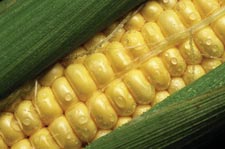Monsanto study: health problems with GE food
by Trudy Bialic
This article was originally published in July 2005

(July 2005) — Revelations of some secret research on genetically engineered (GE) food is heightening concern that eating GE foods could damage human health.
The Independent newspaper in Britain reports that secret research by the biotech giant Monsanto shows rats fed GE corn had smaller kidneys and higher levels of white blood cells and lymphocytes compared to rats fed non-GE food. Monsanto had refused to release its full 1,139-page report. But a European court has ordered Monsanto to release it for publication, under a law ensuring public access to documents on GE risks.
The disclosures come as European nations approach a vote on whether GE corn should be allowed for sale to the public. The revelations of the health effects also intensify a row over whether this GE corn is safe to eat without further research.
Doctors reportedly have testified that changes in the blood of the rats suggest that their immune systems were damaged, or that a disorder such as a tumor had grown and their bodies were mobilizing a response to fight it. Dr. Michael Antoniou, an expert in molecular genetics at Guy’s Hospital Medical School, says he’s “amazed at the number of significant differences they found.”
The Independent says Monsanto has dismissed the abnormalities in the rats as meaningless and due to chance, reflecting normal variations. But a senior British government source says ministers are worried by the findings and are calling for more information.
The findings echo research done several years ago by a famous biochemist, Dr. Arpad Pusztai. He found that rats who ate GE potatoes showed damage to the gut and other organs and damage to the immune system. Puasztai also found that death rates doubled among chickens fed a diet of GE corn.
